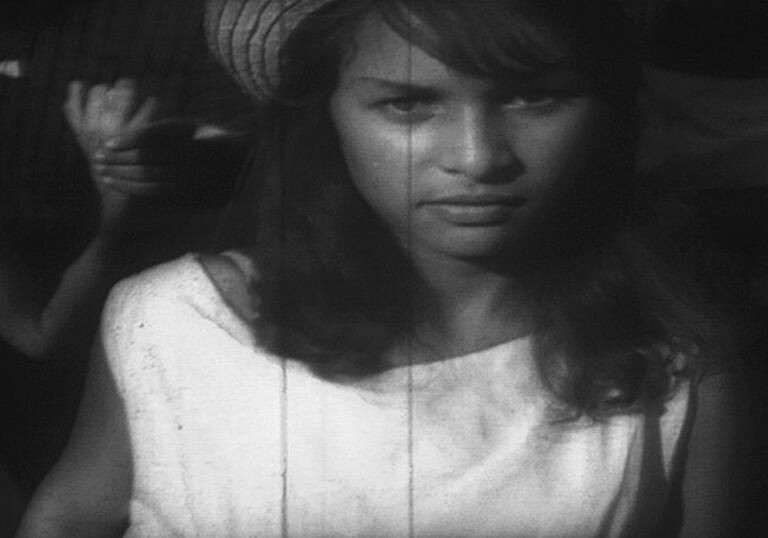Restored Shorts of Nicolás Guillén Landrián (12A)
Cinema Restored x Open City Documentary Festival

Discover the groundbreaking shorts of Nicolás Guillén Landrián (1938-2003), Afro-Cuban filmmaker, painter, and poet.
Nicolás Guillén Landrián (1938 -2003) was an Afro-Cuban filmmaker, painter and poet, committed to a highly personal cinematic vision, focusing on Afro-Cuban life and culture.
Landrián's vision put him at odds with the Cuban state and the principles of the Revolution. His films were bowdlerised and eventually suppressed, and Landrián was sent to prison camps where he was subjected to psychiatric treatment. In 1989 Landrián went into exile in the United States.
Working at Cuba's National Film Institute, Landrián crafted compelling documentaries with a focus on Afro-Cuban life. Despite suppression by the Cuban state, his visionary works have resurfaced thanks to restoration efforts led by filmmaker Ernesto Daranas. Explore Landrián's personal cinematic vision and his enduring legacy in this program of restored shorts.
This is a past event. Subscribe to our newsletters to hear about upcoming events
Booking fees
£1.50 booking fee per online/phone transaction.
No fee when tickets are booked in person.
Booking fees are per transaction and not per ticket. If your booking contains several events the highest booking fee will apply. The booking fee may be reduced on certain events. Members do not pay booking fees.
Biography
Nicolás Guillén Landrián (1938, Camagüey, Cuba -2003, Miami, Florida) was an Afro-Cuban filmmaker, painter and poet. The nephew of Nicolás Guillén, Cuba’s national poet, Landrián worked at the Cuban National Film Institute (ICAIC) from the early 1960s to the early 1970s, making short newsreels and documentaries.
A gifted director with an uncommon creative sensibility, Landrián was committed to a highly personal cinematic vision, which included an unapologetic focus on Afro-Cuban life and culture.
Programme
En un barrio Viejo
Nicolás Guillén Landrián / 1963 / 9'00
A tender and experimental short documentary that weaves a mosaic of Cuba, honing in on a microcosm: an old neighborhood where the nation's identity gradually unfolds amidst its diverse dualities.
Ociel del Toa
Nicolás Guillén Landrián / 1965 / 16'28
Ociel del Toa offers a poetic glimpse into the lives and daily endeavors of the residents along the Toa River, situated in Cuba's Oriente province.
Los del baile
Nicolás Guillén Landrián /1965 / 6'27
Nicolás Guillén Landrián's "Los del baile" vividly portrays the Cuban dance culture with a mix of solemnity and vivacity, set to the rhythms of Pello el Afrokán's music. Despite its vibrant depiction of the Havana night and the infectious energy of the dance floor, the film was banned during the early days of the Cuban revolution for its portrayal of an undesirable image.
Coffea Arábiga
Nicolás Guillén Landrián / 1968 / 17'37
Coffea Arábiga, initially commissioned as a propaganda documentary illustrating coffee cultivation around Havana, instead became a critique of Castro's regime by Guillén Landrián, leading to its exhibition followed by a ban once the coffee plan failed.
See more film for less
Cinema 2
Location
Barbican Cinema 2 & 3 are located on Beech Street, a short walk from the Barbican’s Silk Street entrance. From Silk Street, you’ll see a zebra crossing that will take you across the road to the venue.
Address
Beech Street
London
EC2Y 8DS
Public transport
The Barbican is widely accessible by bus, tube, train and by foot or bicycle. Plan your journey and find more route information in ‘Your Visit’ or book your car parking space in advance.
We’ve plenty of places for you to relax and replenish, from coffee and cake to wood-fired pizzas and full pre-theatre menus
Access
Cinemas 2 & 3 are located at Beech Street, a short walk from the Barbican Centre’s main Silk Street entrance. There are a couple of steep, dropped kerbs and an incline to negotiate between the two sites. Level access from Beech Street.
Mobility
Each auditorium has three permanent wheelchair spaces (two in the third row and one in the front row) and 153 fixed seats with capacity for a further three spaces in the front row. Access to each auditorium is up a ramp. There are also a number of seats with step-free access.
Assistance dogs
Assistance dogs may be taken into the cinema – please tell us when booking to ensure your seat has enough space. If you prefer, you may leave your dog with a member of the foyer staff during the performance.
Hearing facility
An infrared system for hard of hearing customers is provided in each auditorium; headsets or neck loops can be collected from foyer staff. The ticket desk counter is fitted with an induction loop.
For more access information, please visit our Accessibility section.





